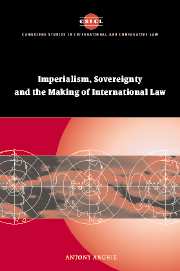Book contents
- Frontmatter
- Contents
- Foreword
- Acknowledgements
- Table of cases
- Table of treaties
- Introduction
- 1 Francisco de Vitoria and the colonial origins of international law
- 2 Finding the peripheries: colonialism in nineteenth-century international law
- 3 Colonialism and the birth of international institutions: the Mandate System of the League of Nations
- 4 Sovereignty and the post-colonial state
- 5 Governance and globalization, civilization and commerce
- 6 On making war on the terrorist: imperialism as self-defence
- Conclusion
- Bibliography
- Index
- CAMBRIDGE STUDIES IN INTERNATIONAL AND COMPARATIVE LAW
3 - Colonialism and the birth of international institutions: the Mandate System of the League of Nations
Published online by Cambridge University Press: 05 August 2012
- Frontmatter
- Contents
- Foreword
- Acknowledgements
- Table of cases
- Table of treaties
- Introduction
- 1 Francisco de Vitoria and the colonial origins of international law
- 2 Finding the peripheries: colonialism in nineteenth-century international law
- 3 Colonialism and the birth of international institutions: the Mandate System of the League of Nations
- 4 Sovereignty and the post-colonial state
- 5 Governance and globalization, civilization and commerce
- 6 On making war on the terrorist: imperialism as self-defence
- Conclusion
- Bibliography
- Index
- CAMBRIDGE STUDIES IN INTERNATIONAL AND COMPARATIVE LAW
Summary
What is wanted here is law, good faith, order, security. Anyone can declaim about these things, but I pin my faith to material interests. Only let the material interests once get a firm footing, and they are bound to impose the conditions on which alone they can continue to exist. That's how your money making here is justified here in the face of lawlessness and disorder. It is justified because the security it demands must be shared with an oppressed people. A better justice will come afterwards.
Introduction
The expansion of European Empires ensured that the entire globe was encompassed by one, European system of international law by the conclusion of the nineteenth century. The great project of dismantling these Empires, of facilitating the transformation of colonial territories into sovereign, independent states, was to become one of the central preoccupations of the United Nations from the 1950s onwards.
The first efforts to begin this radical project of transforming colonial territories into sovereign states commenced, however, immediately after the First World War. It occurred at the same time that another monumental change was taking place in international law, the emergence of international institutions in the form of the League of Nations. Up to the beginning of the twentieth century, sovereign states were the only actors recognized by international law. With the creation of the League, however, the international institution emerged as a new actor in the international system, providing international law with a new range of ambi-tions and techniques for the management of international relations.
- Type
- Chapter
- Information
- Imperialism, Sovereignty and the Making of International Law , pp. 115 - 195Publisher: Cambridge University PressPrint publication year: 2005
- 3
- Cited by

